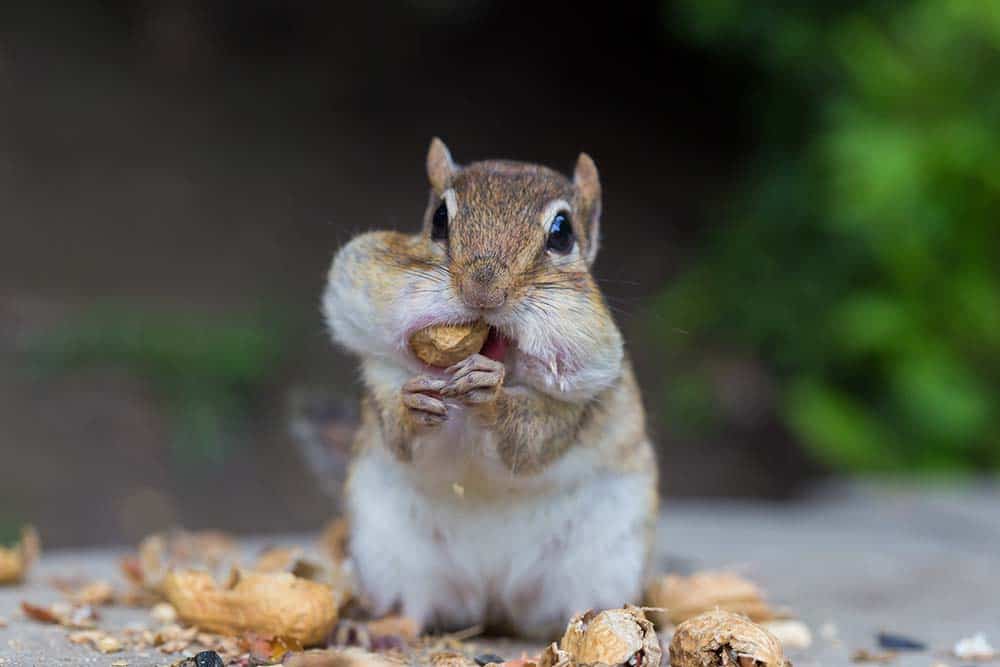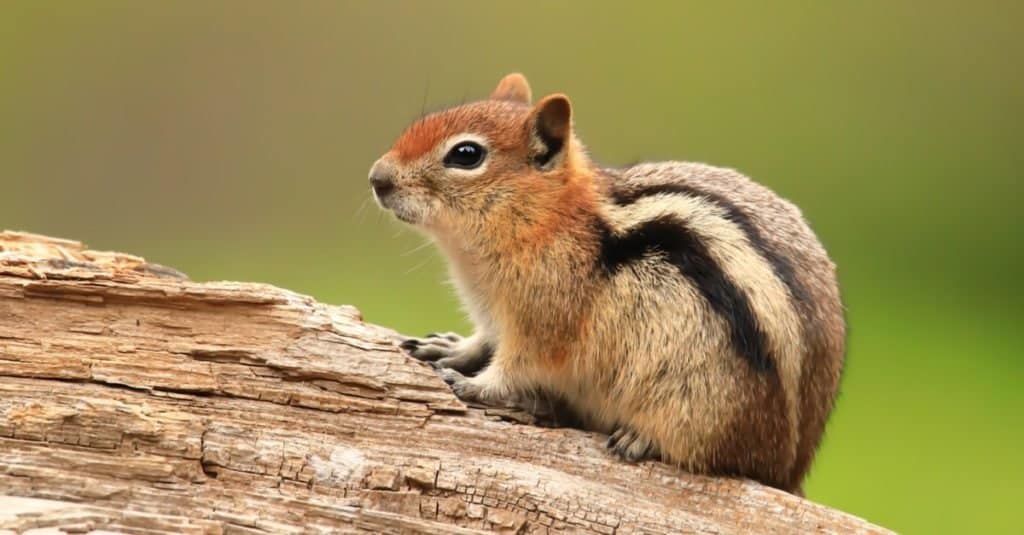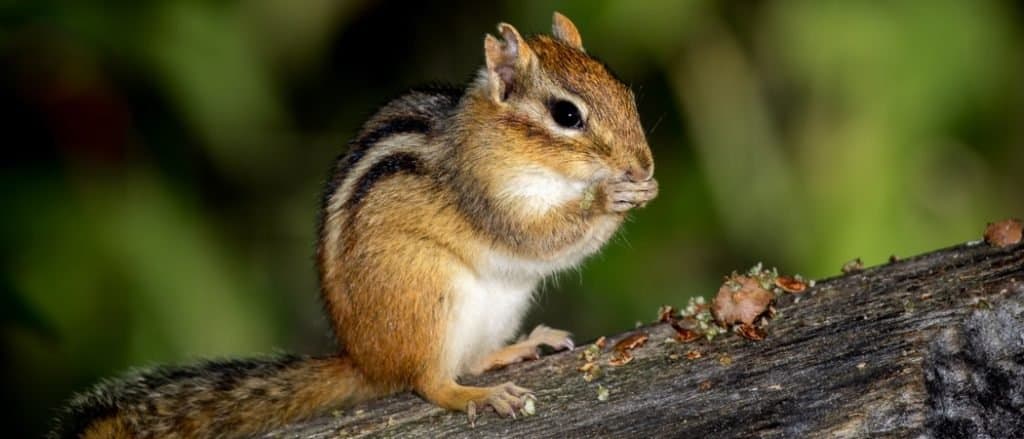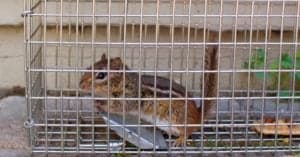Chipmunk Lifespan: How Long Do Chipmunks Live?
@media (min-width: 481px) {
.mobile-top-content {
display: none;
}
}
#mobileTopContentCTACarouselControls { overflow: hidden; text-overflow: ellipsis; white-space: nowrap; }
.mobile-top-content .more { color: #fff; }
.mobile-top-content a { color: #fff; text-decoration: underline; }
.mobile-top-content a:hover { color: #fff; text-decoration: underline; }
@media (max-width: 480px) {
.mobile-top-content {
background-color: #06a10b;
color: #fff;
text-align: center;
/*height: 60px;
padding-top:5px;*/
font-size:80%;
/* display: block; */
margin: 0px -30px;
}
}
With their large, glossy eyes and bushy tails, chipmunks are one of the cuter rodents. While most of us tend to avoid rodents, the chipmunk happens to be an exception. The term chipmunk is actually derived from the “chip-chip” sound made by the animals.
Despite being so cute, chipmunks can actually become a pretty destructive problem to homes, backyards, and farms. A farmer coming across a chipmunk won’t be too delighted to see it. So, have you ever wondered just how long these cute yet destructive critters can live?
Let’s dive into the chipmunk lifespan and answer the question of how long do chipmunks live?
The Rundown on Chipmunks

colacat/Shutterstock.com
Chipmunks are little, striped rodents in the Sciuridae family, sometimes known as the squirrel family. They are the smallest members of the squirrel family with over 25 different species of a chipmunk. All chipmunk species are exclusive to North America except for the Siberian chipmunk. The Siberian chipmunk seems to be the only species found outside of North America, with a range that stretches from central Russia to Japan.
Despite its tiny size, a single chipmunk may gather up to 165 acorns in a single day. There are able to do this thanks to the pouches they have inside their cheeks. This allows them to store their food while continuing to forage. So how long do these tiny foragers live for?
How Long Do Chipmunks Live?

AmberLouise/Shutterstock.com
The average lifespan of a chipmunk in the wild is between 2 and 3 years. Some chipmunk species have been observed to live up to 11 years in captivity, where they have enough food and are safe from predators.
A few notable species:
- Siberian Chipmunk: In the wild, their lifespan is usually anywhere between 2 to 5 years. When they are kept in captivity, their lifespan might range from 6 to 10 years. However, there have been several accounts that have surfaced of pet Siberian chipmunks living for ten years or more.
- Eastern Chipmunk: In most instances, an Eastern chipmunk will not live more than two years. Those who survive, on the other hand, can live in the wild for up to 8 years. When kept in captivity, they may survive for up to 8 years.
- Townsend’s Chipmunk: Townsend’s chipmunks have a very long lifespan in comparison. In the wild, their lifetime ranges from 2 to 7 years. In captivity they have been known to live for 9 to 10 years. Interestingly enough, research conducted by Oregon State University found that Townsend chipmunk can discriminate between kin and non-kin. Although not fully determined, it may be possible that thanks to this distinction they are able facilitate optimal outbreeding.
Now that we’ve taken a look at the average chipmunk lifespan, let’s check out their life cycle.
The Average Chipmunk Life Cycle
No matter the species, all chipmunks have a similar life cycle. Chipmunks, like other rodents, give live births after carrying their offspring around for a designated gestation period. Let’s explore each of the steps of their life.
Mating Season
The chipmunk mating season begins as soon as the weather begins to get warmer. This is because chipmunks will enter a semi-hibernation during the winter. These critters will be mating with a fury from February onwards, generally until approximately April-May. If the weather remains warm enough in early autumn, some eastern chipmunks will mate for the second time.
Gestation Period
After successfully mating, a female chipmunk will enter her gestation period. Both western and eastern chipmunks have a 31-day gestation period. Females give birth to one to eight children at the conclusion of their gestation cycle. A single litter usually contains four or five babies.
Newborns
At birth, chipmunks are the size of a bumblebee. When they are born they are completely helpless and rely on both of their parents to take care of them. They come into the world without any fur and are also blind. They will not have noticeable fur for around ten days. Their ears open around 28 days after birth, and their eyes approximately 31 days.
Adulthood
Young chipmunks exit the burrow for the first time between the ages of four and seven weeks and begin learning to scavenge for food. Chipmunks born in the spring grow rapidly over the summer. They will be full-grown by the fall and begin to build their own shelter and begin gathering food to sustain them through the winter.
Common Factors That Impact the Chipmunk Lifespan

RT Images/Shutterstock.com
A chipmunk’s lifetime can be reduced by a variety of factors, many reasons that are uncontrollable by them. These are some of the most common examples:
Victims of Predators
One of the largest factors in how long a chipmunk will live is the degree of predator activity. No matter the species of chipmunks, they are all susceptible to predator attacks. This is why almost every species does not live a complete year, because of predator attacks. About two months after birth, most chipmunks are completely separate from their moms. These young chipmunks are the most vulnerable to being preyed upon.
Sickness
Chipmunks are vulnerable to ailments such as Metabolic Bone Disease, upper respiratory infections, and dental difficulties. Metabolic bone disease is mainly caused by a calcium shortage. Chipmunks tend to suffer calcium shortages when they consume phosphorus-rich but calcium-deficient nuts and seeds. Tooth loss, misplaced teeth, and overgrown teeth are all examples of tooth disorders that can prevent a chipmunk from being able to eat. Without being able to eat seeds and nuts, the chipmunk will starve and die.
Weather
To survive the winter, several chipmunk species engage in a semi-hibernation. In this semi-hibernation state, they will wake up every few days to eat and defecate. Severe weather conditions in the spring and summer might restrict the quantity of food available for chipmunks to save up for the winter. A harsh winter might test a chipmunk’s capacity to tolerate the cold as they must go out for food more often. If the weather is particularly harsh, then the chipmunk may freeze.
More from A-Z Animals
.more-snake-card-image { max-height:140px !important; }
@media (min-width: 481px) {
.mobile-top-content {
display: none;
}
}
#mobileTopContentCTACarouselControls { overflow: hidden; text-overflow: ellipsis; white-space: nowrap; }
.mobile-top-content .more { color: #fff; }
.mobile-top-content a { color: #fff; text-decoration: underline; }
.mobile-top-content a:hover { color: #fff; text-decoration: underline; }
@media (max-width: 480px) {
.mobile-top-content {
background-color: #06a10b;
color: #fff;
text-align: center;
/*height: 60px;
padding-top:5px;*/
font-size:80%;
/* display: block; */
margin: 0px -30px;
}
}
With their large, glossy eyes and bushy tails, chipmunks are one of the cuter rodents. While most of us tend to avoid rodents, the chipmunk happens to be an exception. The term chipmunk is actually derived from the “chip-chip” sound made by the animals.
Despite being so cute, chipmunks can actually become a pretty destructive problem to homes, backyards, and farms. A farmer coming across a chipmunk won’t be too delighted to see it. So, have you ever wondered just how long these cute yet destructive critters can live?
Let’s dive into the chipmunk lifespan and answer the question of how long do chipmunks live?
The Rundown on Chipmunks

colacat/Shutterstock.com
Chipmunks are little, striped rodents in the Sciuridae family, sometimes known as the squirrel family. They are the smallest members of the squirrel family with over 25 different species of a chipmunk. All chipmunk species are exclusive to North America except for the Siberian chipmunk. The Siberian chipmunk seems to be the only species found outside of North America, with a range that stretches from central Russia to Japan.
Despite its tiny size, a single chipmunk may gather up to 165 acorns in a single day. There are able to do this thanks to the pouches they have inside their cheeks. This allows them to store their food while continuing to forage. So how long do these tiny foragers live for?
How Long Do Chipmunks Live?

AmberLouise/Shutterstock.com
The average lifespan of a chipmunk in the wild is between 2 and 3 years. Some chipmunk species have been observed to live up to 11 years in captivity, where they have enough food and are safe from predators.
A few notable species:
- Siberian Chipmunk: In the wild, their lifespan is usually anywhere between 2 to 5 years. When they are kept in captivity, their lifespan might range from 6 to 10 years. However, there have been several accounts that have surfaced of pet Siberian chipmunks living for ten years or more.
- Eastern Chipmunk: In most instances, an Eastern chipmunk will not live more than two years. Those who survive, on the other hand, can live in the wild for up to 8 years. When kept in captivity, they may survive for up to 8 years.
- Townsend’s Chipmunk: Townsend’s chipmunks have a very long lifespan in comparison. In the wild, their lifetime ranges from 2 to 7 years. In captivity they have been known to live for 9 to 10 years. Interestingly enough, research conducted by Oregon State University found that Townsend chipmunk can discriminate between kin and non-kin. Although not fully determined, it may be possible that thanks to this distinction they are able facilitate optimal outbreeding.
Now that we’ve taken a look at the average chipmunk lifespan, let’s check out their life cycle.
The Average Chipmunk Life Cycle
No matter the species, all chipmunks have a similar life cycle. Chipmunks, like other rodents, give live births after carrying their offspring around for a designated gestation period. Let’s explore each of the steps of their life.
Mating Season
The chipmunk mating season begins as soon as the weather begins to get warmer. This is because chipmunks will enter a semi-hibernation during the winter. These critters will be mating with a fury from February onwards, generally until approximately April-May. If the weather remains warm enough in early autumn, some eastern chipmunks will mate for the second time.
Gestation Period
After successfully mating, a female chipmunk will enter her gestation period. Both western and eastern chipmunks have a 31-day gestation period. Females give birth to one to eight children at the conclusion of their gestation cycle. A single litter usually contains four or five babies.
Newborns
At birth, chipmunks are the size of a bumblebee. When they are born they are completely helpless and rely on both of their parents to take care of them. They come into the world without any fur and are also blind. They will not have noticeable fur for around ten days. Their ears open around 28 days after birth, and their eyes approximately 31 days.
Adulthood
Young chipmunks exit the burrow for the first time between the ages of four and seven weeks and begin learning to scavenge for food. Chipmunks born in the spring grow rapidly over the summer. They will be full-grown by the fall and begin to build their own shelter and begin gathering food to sustain them through the winter.
Common Factors That Impact the Chipmunk Lifespan

RT Images/Shutterstock.com
A chipmunk’s lifetime can be reduced by a variety of factors, many reasons that are uncontrollable by them. These are some of the most common examples:
Victims of Predators
One of the largest factors in how long a chipmunk will live is the degree of predator activity. No matter the species of chipmunks, they are all susceptible to predator attacks. This is why almost every species does not live a complete year, because of predator attacks. About two months after birth, most chipmunks are completely separate from their moms. These young chipmunks are the most vulnerable to being preyed upon.
Sickness
Chipmunks are vulnerable to ailments such as Metabolic Bone Disease, upper respiratory infections, and dental difficulties. Metabolic bone disease is mainly caused by a calcium shortage. Chipmunks tend to suffer calcium shortages when they consume phosphorus-rich but calcium-deficient nuts and seeds. Tooth loss, misplaced teeth, and overgrown teeth are all examples of tooth disorders that can prevent a chipmunk from being able to eat. Without being able to eat seeds and nuts, the chipmunk will starve and die.
Weather
To survive the winter, several chipmunk species engage in a semi-hibernation. In this semi-hibernation state, they will wake up every few days to eat and defecate. Severe weather conditions in the spring and summer might restrict the quantity of food available for chipmunks to save up for the winter. A harsh winter might test a chipmunk’s capacity to tolerate the cold as they must go out for food more often. If the weather is particularly harsh, then the chipmunk may freeze.





